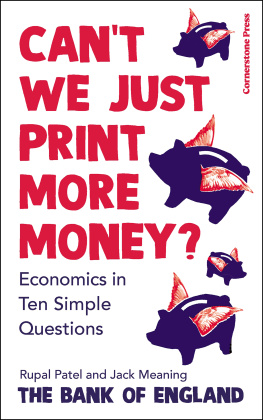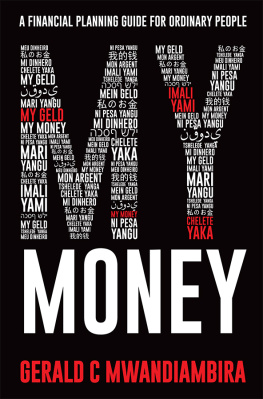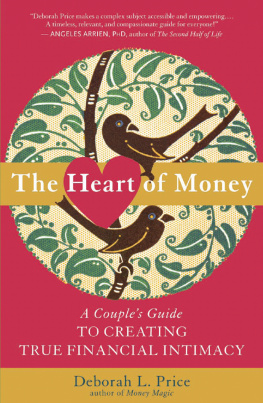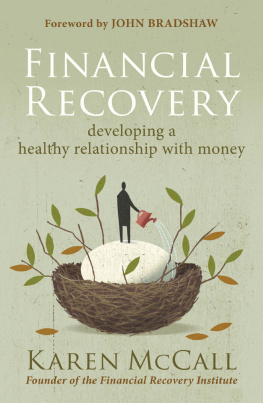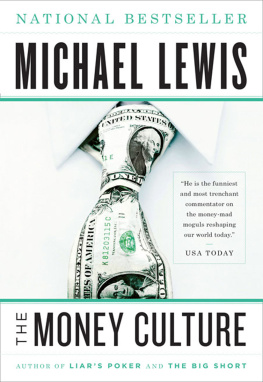If you learn how money moves, you can understand how the world works.
ANN RICHARDS, FORMER GOVERNOR OF TEXAS, IN CONVERSATION, AS REPORTED BY A COLLEAGUE
T he world of money used to be simple. A person might have both a checking and a savings account, a home mortgage and a car loan, and maybe some basic investments in the markets, like municipal bonds or shares in Sears, Roebuck or General Motors. But rarely were a persons finances more complex than that. Wall Street wasnt particularly controversial. The financial services industry didnt have a reputation for being impersonal, selfish, and reckless. Most of the time, it was seen as just another facet of a functioning and growing society.
That all started to change rapidly in the 1980s as our financial system became increasingly complicated, with each evolution moving the world of money further beyond the understanding of the general public. Wall Street began to feel like an adversary, an enigmatic and potentially dangerous force controlled by slippery bankers whom we didnt trust. After the mortgage crisis, collapse of banks, and Great Recession of 2008, our wariness boiled over into anger. The system no longer seemed to be working for the average person.
How did we get here? In just one generation, how did our financial system become so labyrinthine and loaded with peril as we became more disconnected from its workings?
Why do we care so little that the national debt is more than $20 trillion and growing? Why do we care so little that our government employee pension system is massively underfunded, with the gap growing wider each year? Why do we care so little that we have grossly insufficient funding for promised Social Security and healthcare benefits? Why do we care so little that student debt stands at $1.6 trillion, weighing down millions of graduates who cant find jobs worthy of their degrees and are incapable of repaying what they owe?
Is it really the case that we dont care about these looming crises, or is it that we feel shackled by our lack of understanding and connection? Whatever the reason, the result is the same. As the world of money continues to become a bigger and bigger part of our lives, we understand it less and less. Everyone talks about sustainability these daysin regard to the environment, or food, or economic matters, or cultural and social issuesbut no one is talking about the sustainability of our financial system, despite the fact that it occupies such a prominent place in our human existence and future well-being. This is the most important discussion that we are not having.
If we stand by, remaining disengaged from the world of money, we are headed to a dangerous place. Regardless of your background or occupation, this will affect you in your lifetime, most assuredly altering your childrens quality of life. It is imperative that we increase our knowledge and engagement with the financial world and change the current trajectory. Otherwise it will end badly for us all.
* * *
My first exposure to the financial world was in 1970 in the second grade, when Mr. Samson, the manager of Springfield Savings and Loan, came to speak to our class about banks. There was nothing exotic about Mr. Samson; he wore a gray suit, red tie, and shiny grown-up shoes. He circled the room with a stack of booklets, passing one to each of us. On the cover, the logo of the bank was printed, along with a place for me to scrawl my name. I flipped through its pages of unfilled lines and boxes, each page backed by the ghosted portrait of a US president. As we inspected our booklets, Mr. Samson instructed us to pull out the dimes wed been asked to bring to class. Mine had been burning a hole in my pocket all day.
Those dimes, he said, are your first deposit. If you bring in a dime every week, Ill come by on Fridays to collect them and give you a stamp for your book, then Ill deposit your money in the bank. While its in the bank, your money will collect interest, which means well reward your account with a little bonus each month. And during the time your money is with us, we might use it for other purposes, such as loaning it out to people who are opening a new shop or buying a house. Any time you want to withdraw your money, you just come down to see us. But if you leave it alone and let it grow, after time, youll have accumulated savings.
Our teacher told us to line up. At the table in the front of the room, Mr. Samson collected our dimes in a black leather bag and stamped the first pages of our books to verify our deposits.
There are thirty weeks left in the school year, he said. If you bring in your dime every week, youll have saved three dollars by summer break.
We were floored by the prospect that we could someday possess that much money. Back at my desk, I quickly calculated how much I could save if I did this for three additional years, until the end of fifth grade. Three plus three plus three plus three. WhoaI could have twelve dollars. From that day on, I brought in my dime every week, without fail, and assiduously filled my book with stamps.
My parents experience with money wasnt much more complicated than what Mr. Samson taught us that day in second grade. Back then, in the late 1960s, when their friends paid off their mortgages, they would often throw a party at which they would burn their mortgage slips. Finance was simple enough that the common path for a family was to purchase a home, dutifully work to pay down the mortgage, then enjoy an easier retirement. That level of simplicity is almost unheard of today.
We spend so much time worrying about money nowalmost around the clockand I cant say that makes us better off. Yet on the flip side, there was a time not too long ago when we didnt have the many advantages the financial world now provides. For example, mortgages werent widely available to the general public. If you wanted to buy a house, you had to save up the entire purchase price. So the increase in complexity in the financial world has also brought with it products that have made many peoples lives better. Modern finance always seems a double-edged sword, which is why the universe of money has long intrigued me.
I got my first glimpse of the dangerous side of money in high school, when my family moved from Springfield, Massachusetts, to Orange County, California. My father had been offered a new job as CEO of a company that had been acquired in a leveraged buyout. I vividly recall him distraught at the dinner table, talking about how interest rates had skyrocketed, and as a result, he was forced to cut costs at his new company in order to service the debt. Cutting costs meant cutting jobs, and my father felt a heavy responsibility for his employees and concern for their families. At that young age, seeing the effect of those pressures on my father and his company, I had little understanding of leveraged buyouts and the movement of interest rates, yet I was filled with apprehensionwhat would happen to the people who lost their jobs due to the cutbacks? How did those larger, external economic factors force my father to make uncomfortable and unpopular decisions? It would take years before I could begin to understand these concepts and their impact on peoples lives.
Ending up working in finance, however, surprised me at first, because Ive never had the cutthroat personality for which Wall Street is notoriousI worked at Disneyland while studying liberal arts at Occidental Collegenor have I ever developed a lust for fast cars, fancy watches, and vacation houses, the tokens of status and accomplishment that are the trophies of the banking world. I simply loved the work. And Ive been lucky enough to have a role in or a ringside seat for many of the big financial moments over the past three decades. After college in the 1980s, I started as a corporate lending officer for Bank of America, loaning money to gold and diamond wholesalers in LAs jewelry district, then attended The Wharton School. I landed at Salomon Brothers in the 1990s, working my way from the trading floor through the investment bank until I served as the global head of Citis TMT (technology, media, and telecom) group, head of the National Investment Bank and the regional offices, as well as Citis first culture czar. After twenty years, I left Wall Street to cofound a private equity firm in Silicon Valley.


